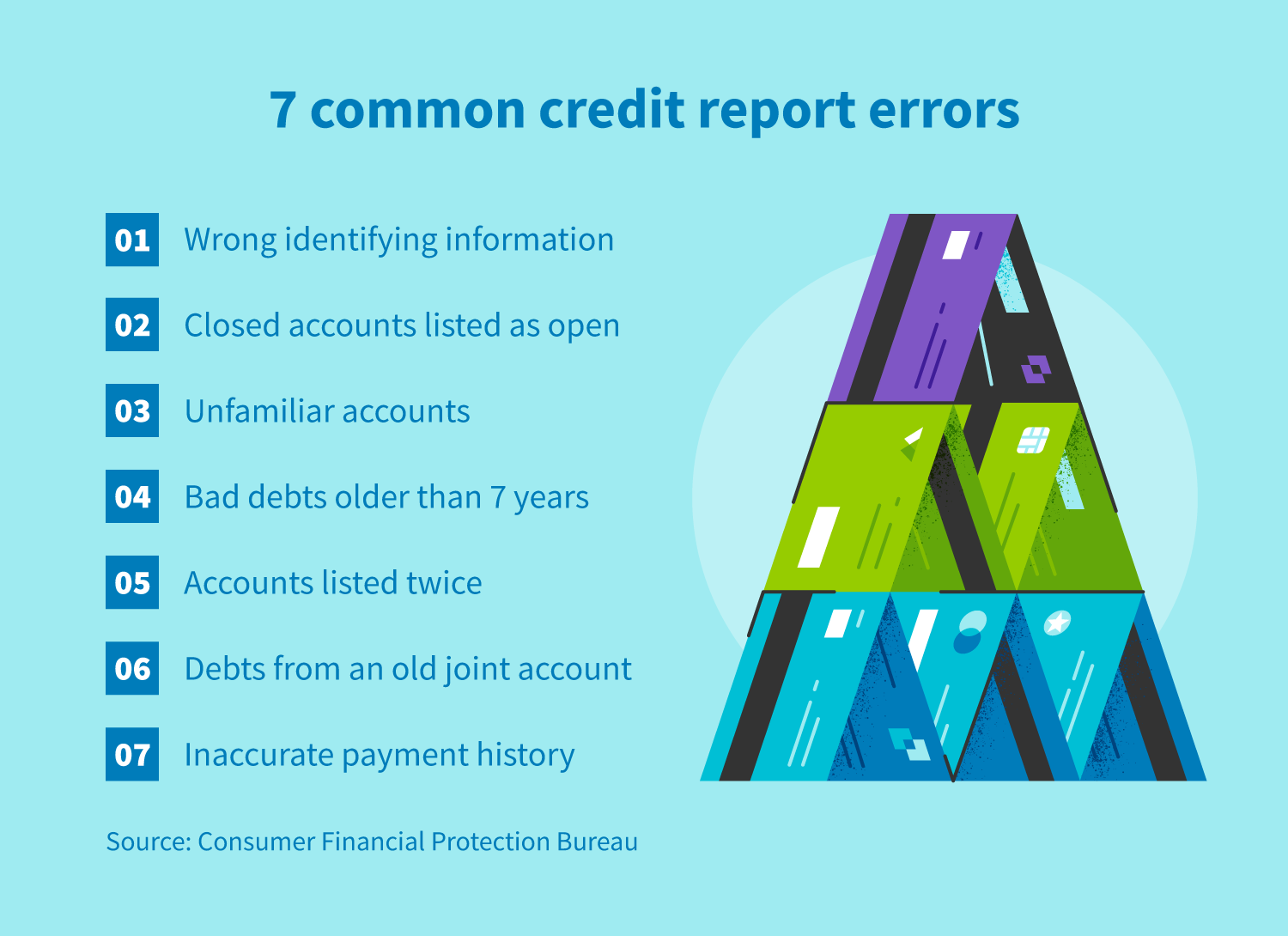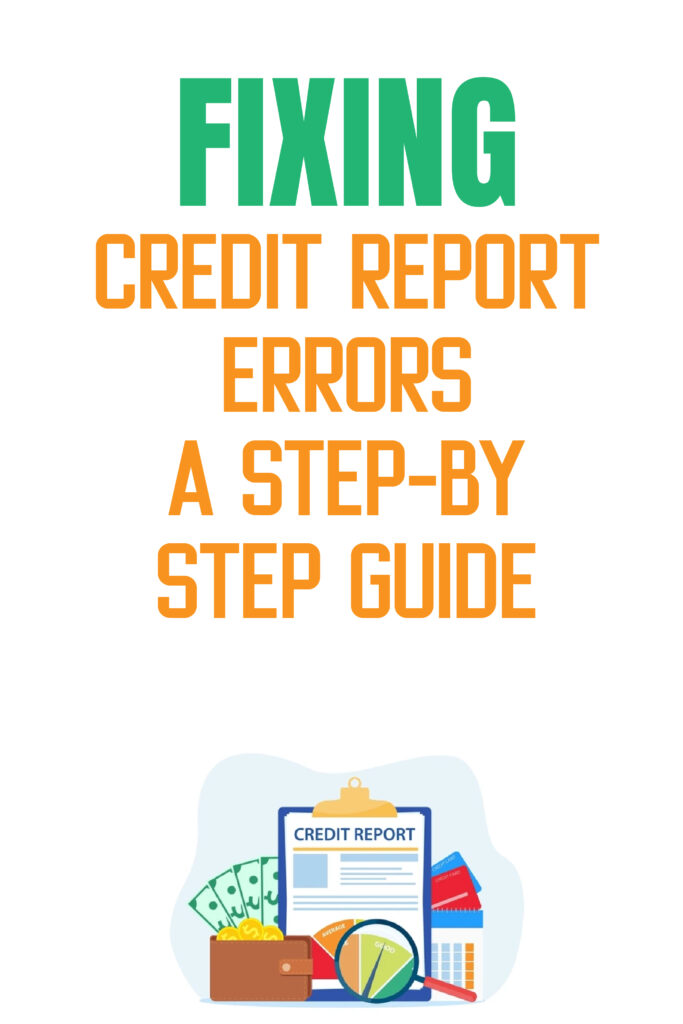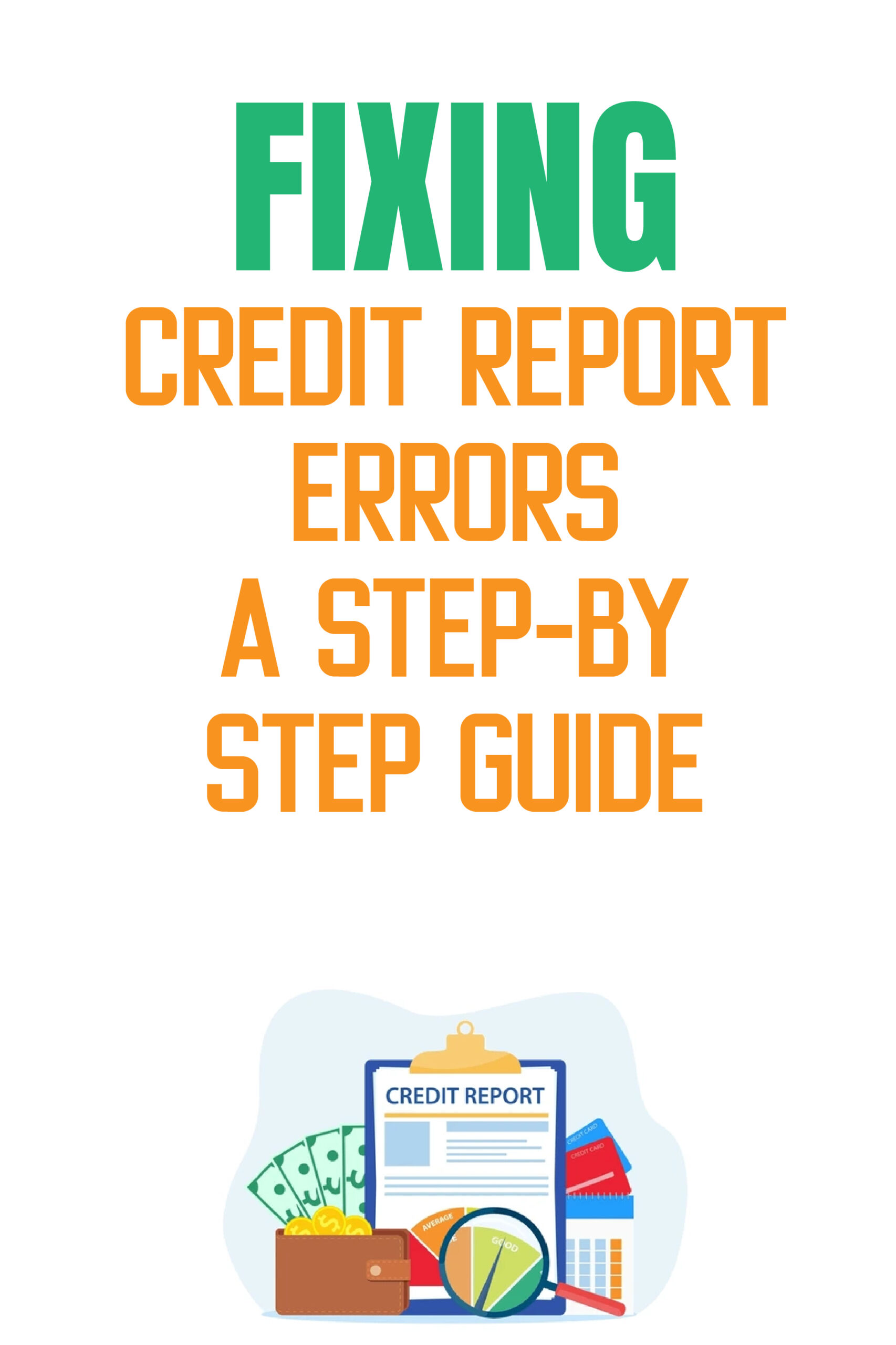To fix credit report errors, gather supporting documents and submit a dispute to the credit bureau. Follow up until the error is corrected.
Errors on credit reports can damage your financial health. Incorrect information might lower your credit score and affect loan approvals. Taking prompt action to correct these errors is crucial. Start by reviewing your credit report thoroughly for any inaccuracies. Collect evidence to support your claim, such as bank statements or transaction records.
Submit a detailed dispute to the credit bureau that issued the report. Be persistent in following up until the error is resolved. Fixing these errors helps maintain a healthy credit score and ensures accurate financial records.

Credit: www.creditrepair.com
Gather Your Credit Reports
To fix credit report errors, start by gathering your credit reports. This is the first step in ensuring your credit information is accurate.
Where To Get Free Reports
You can get free credit reports from three main credit bureaus:
- Equifax
- Experian
- TransUnion
Visit AnnualCreditReport.com. You can get one free report from each bureau yearly.
How To Request Reports
Follow these steps to request your credit reports:
- Go to AnnualCreditReport.com.
- Click on “Request your free credit reports”.
- Fill out the form with your personal details.
- Select the reports you want to request.
- Answer security questions to verify your identity.
- Download your reports and save them securely.
Keep a printed copy for your records.
Review each report carefully. Look for any errors or incorrect information.
Common errors include:
- Incorrect personal information
- Accounts that don’t belong to you
- Wrong account balances
- Duplicate accounts
- Outdated information
Highlight any issues you find. You will need this for the next steps.

Credit: www.pinterest.com
Review Your Credit Reports
Reviewing your credit report is important. It helps you spot errors. These errors can affect your credit score. A good credit score is essential for loans and credit cards. Let’s learn how to review your credit report effectively.
Identifying Errors
First, download your credit reports. You can get them from Experian, Equifax, and TransUnion. Check for errors like:
- Wrong personal information
- Incorrect account details
- Duplicate accounts
- Wrong credit limits
- Incorrect payment statuses
These mistakes can hurt your credit score. Fixing them is crucial.
Understanding Report Sections
Your credit report has different sections. Understanding these sections helps you spot errors. The main sections are:
| Section | Description |
|---|---|
| Personal Information | Contains your name, address, and social security number. |
| Credit Accounts | Lists your credit cards, loans, and payment history. |
| Public Records | Shows bankruptcies, liens, and other public records. |
| Inquiries | Lists who has checked your credit report. |
Review each section carefully. Make sure all details are correct. This ensures your credit report is accurate.
Document Errors
Errors in your credit report can harm your financial health. Fixing these errors improves your credit score and helps you get better loan terms. This section explains how to document errors effectively.
Creating A List
Start by creating a list of all errors. Use a table to organize them:
| Error Type | Description | Location |
|---|---|---|
| Incorrect Account | An account not belonging to you | Section 3, Page 2 |
| Wrong Balance | Balance shows $5000 instead of $2000 | Section 4, Page 3 |
Collecting Evidence
Gather evidence to support your claims. This evidence can include:
- Bank statements
- Payment receipts
- Correspondence with creditors
Ensure your evidence is clear and relevant. For each error, match the evidence to the error. For example:
- Incorrect Account: Provide a letter from the creditor confirming the account is not yours.
- Wrong Balance: Show a recent bank statement with the correct balance.
Documenting errors thoroughly helps in resolving disputes quickly.
Dispute Errors With Credit Bureaus
Credit report errors can hurt your credit score. Fixing these errors is crucial. Dispute errors with credit bureaus to correct them. This process involves writing letters or disputing online. Let’s explore these methods.
Writing A Dispute Letter
Writing a dispute letter is a formal way to correct errors. Follow these steps:
- Gather your credit report.
- Identify errors clearly.
- Write a clear and concise letter.
- Include supporting documents.
- Send the letter via certified mail.
Here’s a sample dispute letter:
[Your Name]
[Your Address]
[City, State, ZIP Code]
[Date]
[Credit Bureau Name]
[Address]
[City, State, ZIP Code]
Dear [Credit Bureau Name],
I am writing to dispute an error on my credit report. The information is incorrect. Please correct the following:
- Account Name: [Incorrect Account Name]
- Incorrect Info: [Describe the error]
Enclosed are copies of documents supporting my claim.
Thank you,
[Your Name]
Online Dispute Process
Disputing errors online is quick and easy. Follow these steps:
- Visit the credit bureau’s website.
- Log into your account.
- Find the dispute section.
- Select the error to dispute.
- Upload supporting documents.
- Submit your dispute.
Credit bureaus usually respond within 30 days. Check your email for updates. Always keep copies of your dispute and any responses.
Follow Up On Disputes
Errors on your credit report can harm your financial health. Fixing these errors is crucial. After submitting your dispute, follow up is key. This ensures your corrections are recognized. Here’s how to effectively follow up on your disputes.
Tracking Your Disputes
Keep a record of all your disputes. Use a spreadsheet to track each one.
| Dispute Date | Credit Bureau | Disputed Item | Status |
|---|---|---|---|
| 2023-10-01 | Equifax | Incorrect Address | Pending |
| 2023-10-05 | TransUnion | Late Payment | Resolved |
Document every communication. Save emails and letters. This helps if you need to escalate.
Response Times
Credit bureaus must respond within 30 days. Mark your calendar. If they miss the deadline, follow up promptly.
- Wait for 30 days.
- Check your dispute status.
- Contact the bureau if there’s no response.
Always use certified mail. This provides proof of your communication. Be persistent. Your credit health depends on it.

Credit: fortune.com
Correct Information With Creditors
Fixing credit report errors is crucial for your financial health. One key step is to correct information with creditors. This ensures your credit report reflects accurate data. Let’s dive into the essential steps.
Contacting Creditors Directly
Contacting creditors directly is the first step. This can be done through phone or email. Clearly explain the error and request a correction. Be polite and professional during the conversation. Keep a record of all communication for future reference.
Providing Documentation
Providing documentation is crucial to support your claim. Gather all necessary documents such as:
- Bank statements
- Payment receipts
- Previous correspondence
Submit these documents to your creditor. This helps validate your request and speeds up the correction process.
Here is an example of an organized submission:
| Document Type | Details |
|---|---|
| Bank Statement | Shows payment made on the disputed date |
| Payment Receipt | Confirms the amount paid |
| Correspondence | Previous emails discussing the issue |
Ensure all documents are clear and legible. This makes it easier for creditors to understand and act on your request.

Maintain Accurate Credit Reports
Maintaining accurate credit reports is crucial for your financial health. Errors on your credit report can lower your credit score. This can affect your ability to get loans, mortgages, or even a job. Ensuring your credit report is correct helps you avoid these issues.
Regular Monitoring
Regular monitoring of your credit report is essential. It helps you spot errors quickly. You can get a free credit report from each of the three major bureaus once a year.
- Experian
- Equifax
- TransUnion
Check your reports for inaccuracies. Look for incorrect personal information, wrong account details, and unauthorized transactions. If you find any errors, report them immediately.
Using Credit Monitoring Services
Credit monitoring services can help you keep track of your credit report. These services alert you to any changes in your credit file. They can notify you of new accounts, hard inquiries, and changes in your credit score.
Popular credit monitoring services include:
| Service | Key Features |
|---|---|
| Credit Karma | Free credit scores, alerts, and financial tools |
| Experian CreditWorks | Daily monitoring, FICO scores, and fraud resolution |
| IdentityGuard | Comprehensive monitoring, alerts, and identity theft protection |
Using these services ensures you stay informed about your credit status. This helps you act quickly if there are any discrepancies. Keeping your credit report accurate protects your financial future.
Frequently Asked Questions
Can You Fix Errors On Your Credit Report?
Yes, you can fix errors on your credit report. Contact credit bureaus to dispute inaccuracies. Provide evidence supporting your claim.
How Do I Get Something Removed From My Credit Report?
To remove an item from your credit report, contact the credit bureau. Dispute errors online or by mail. Provide supporting documents. The bureau will investigate and respond within 30 days. If valid, the item will be removed.
What Are The Three Most Common Credit Report Errors?
The three most common credit report errors are incorrect personal information, accounts that don’t belong to you, and outdated information. Always review your report for accuracy.
What Is The 609 Credit Repair Loophole?
The 609 credit repair loophole involves disputing negative items on your credit report using Section 609 of the Fair Credit Reporting Act.
Conclusion
Fixing credit report errors is crucial for financial health. Regularly check your credit report for inaccuracies. Dispute any errors immediately to protect your credit score. Stay proactive and informed about your credit status. By doing so, you can ensure better financial opportunities and peace of mind.

